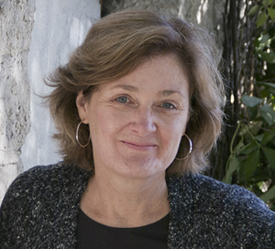Unity of the Novella:
Noah Armstrong
in Conversation with Joan Thomas

Malahat volunteer Noah Armstrong talks about illuminations, pragmatism, and the intesity of the novella with writer Joan Thomas, one of three judges for our upcoming 2016 Novella Prize.
You have written and published three separate and very successful novels throughout the course of your writing career. What advice would you give to new and emerging writers that aspire to a similar career path?
Writing novels is very rarely a career path, even if the work is well received. So it works out better to think of writing as cultivating an artistic practice. My advice would be: nurture that little flame of illumination (your own unique vision of the world), and read widely and deeply. Focus on the intrinsic joys because they are what sustain you.
What are the key elements and distinguishing characteristics of your own writing habits and creative process?
I don’t think there’s anything unique in my writing routine and processes. The more writers I get to know, the more I’m struck by the commonalities in the way we work—how we all rely on our intuition to draw us to a subject, and on our persistence (obsession, even) to keep us returning to a passage until we get it right.
My novels are quite different from each other, to a degree that I think is a bit unusual among writers. But in all three, I aim for intimacy in the narrative voice, even when I’m writing in the 3rd person, even when my character lives in, say, the early 19th century, or is a deeply flawed and perhaps unlikeable individual. I always aim to sink deeply into another consciousness and to portray this consciousness in a wry and unsentimental way.
Novella is a sub-genre leading up to novels. What are the universal valuable aspects of novella fiction that make it a lasting and valued genre?
Novellas are the perfect vehicle for an unusual point of view or voice that would be hard to sustain for three hundred pages, or for probing a single arresting incident: What if this happened? Just this?
Nobody writes novellas for pragmatic reasons; they’re too hard to publish. So when I read a novella I know the writer was compelled by an artistic impulse, and that’s always good.
When judging an open competition that is not restricted by genre, what are some key elements you look for to distinguish the quality of the pieces you will be reviewing?
What I look for in fiction in general is pleasure in language and style (language that serves the story and is not contrived), psychological depth, wit, and a deft interplay of feasibility and surprise.
What are some of the strongest elements that make a good novella fiction piece? What are some elements characteristic of a novella that you believe should be intrinsic in all the pieces you’ll be judging?
Novellas are the espresso of fiction, not in the sense of being quick, but in their intensity, the way every word delivers a hit. Ian McEwan’s “Some Notes on the Novella” in the October 2012 New Yorker is a terrific essay, well worth checking out. McEwan says the novella “lays on the writer a duty of unity and the pursuit of perfection.”
What “unity” means is open to interpretation, I think. Some definitions specify that novellas will be written from a single point of view, or will have no subplots, but I don’t hold to any hard-and-fast rules. I’ll be looking for the qualities I mentioned above, for a story that carries all the force of a novel in fewer pages. It’s funny that I was asked to judge this contest just now, because lately my prevailing reaction as I read has been This is too long. Even reading a novel that sentence by sentence is pretty close to brilliant, I often think that the work would have twice as much impact if it were half the length.
So I’m delighted at the prospect of spending a few weeks this spring reading novellas for The Malahat Review, savouring the sort of fiction that continues to develop in your mind after you reluctantly come to the end.

Noah Armstrong
* * * * * * * *
Read full guidelines for the 2016 Novella Prize.









